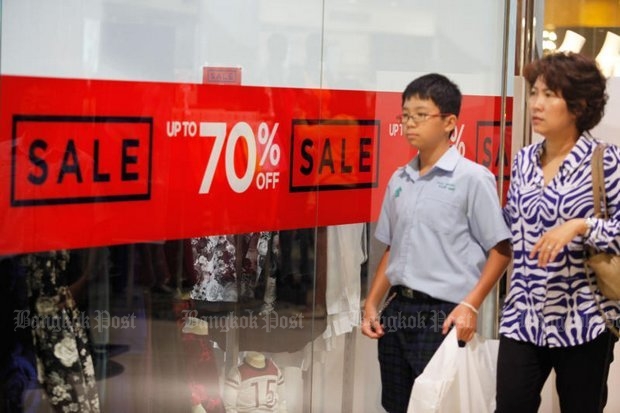
With the sluggish economy and poor export performance in the second half, the business sector is concerned that Thai economic growth may fail to reach 3.3-3.5% as forecast.
Isara Vongkusolkit, chairman of Thai Chamber of Commerce, in his capacity as chairman of the Joint Standing Committee on Commerce, Industry and Banking (JSCCIB), said overall exports remain weak, in line with the slow pace of the world's trade climate, while domestic economic development is quite slow as domestic consumption is still fragile amid cautious spending.
The Commerce Ministry reported on Nov 30 that exports fell 4.2% year-on-year in October to US$17.78 billion after growing 3.4% year-on-year in September and 6.5% in August.
Officials blamed easing demand from major markets and weaker shipments of gold and oil-related products.
The ministry said exports of agricultural and agribusiness products slipped back into contraction after gains in September, falling 8.1% from October last year to $2.63 billion on lower shipments of sugar, rice, tapioca products and rubber.
Exports of industrial products fell for the first time in three months, down 2.7% at $14.15 billion, led by finished oil, computers, gold, cars and auto products, steel and TV sets.
In October, imports were 6.5% higher from the previous year at $17.53 billion, producing a trade surplus of $248 million.
For the first 10 months of 2016, exports totalled $178.25 billion, down 1% year-on-year, with imports shrinking 5.9% to $160 billion.
The Commerce Ministry forecast exports to remain at between zero growth and 1% contraction this year.
"Nonetheless, we still hope the government's stimulus measures will help shore up economic growth this year," Mr Isara said.
The Finance Ministry is seeking cabinet approval for holiday tax breaks, which are more aggressive this year, doubling the cap on claimed value to 30,000 baht per shopper. The period will also be lengthened from last year's seven days. The proposal was supposed to go before the cabinet's approval last Tuesday but was put off.
According to Mr Isara, the business sector forecasts economic growth of 3.5-4% next year, but admitted a spate of risk factors, particularly US President-elect Donald Trump's protectionist trade policies, may dampen the global trade and investment climate.
Possible rate hikes by the US Federal Reserve are also expected to affect the global capital flows and foreign exchanges, and elections will be held in many countries in Europe next year, possibly coming with new trade and investment policies.
"In 2017, the Netherlands, France and Germany are scheduled to hold their general elections," Mr Isara said. "We need to closely monitor the new cabinet line-ups of those countries and if they create new policies for the European economy, their banking sectors and the euro."
Amid these risk factors, he said the business sector remains confident about next year's economic prospects, driven largely by state economic stimulus and spending measures and growing tourism, as well as provincial development plans.